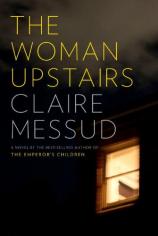The Woman Upstairs
Review
The Woman Upstairs
Nora Eldridge, the protagonist of THE WOMAN UPSTAIRS, Claire Messud’s unsettling new novel, refers often to “The Ballad of Lucy Jordan,” a song popularized by Marianne Faithfull and written by Shel Silverstein. The song is about a woman who, like Nora, is 37 and despairs over having never achieved her dreams. Lucy’s anguish becomes so great that she eventually climbs onto the roof of her comfortable suburban home and doesn’t come down until a man arrives from a mental institution, proffers a helping hand and takes her away.
The Nora that Messud has created is actually a combination of two Silverstein heroines: Lucy Jordan, and the apple tree in the children’s book THE GIVING TREE. The latter gives everything she possesses to the little boy who makes constant demands of her, until she is a stump with nothing left to give. Nora, though hardly as big a martyr as the tree, feels the same way about herself. She is “the woman upstairs,” her term for every pleasant neighbor who silently harbors resentment at the way her life has turned out. And as she tells us in the profanity-laden tirade that opens the book, she is one of the angrier upstairs women you will ever meet.
"THE WOMAN UPSTAIRS is a thoughtful, quiet novel about the need for fulfillment and the search for reasons to keep from climbing onto the roof."
Nora once dreamed of becoming an artist, but at her mother’s insistence forewent art school and went to Middlebury instead. She became a management consultant for a while to make money. She cared for her mother when the latter developed ALS. Now Nora is a third-grade teacher at the Appleton School in Cambridge, Massachusetts. When she isn’t teaching, she’s often spending time with her elderly father, a retired insurance salesman. She used to create large, messy paintings but switched to small dioramas when her mother became ill. She still makes her dioramas but doesn’t show them for fear of the reception they would receive. Hidden in each diorama, often in a place where viewers might miss it, is a small gold figure meant to represent Joy.
Nora is resigned to her life when eight-year-old Reza Shahid joins her class. The boy charms her, and not just because of the way his beautiful black curls fall upon his neck. He comforts a girl he accidentally knocks down during a soccer match and apologizes to Nora when he and other students make a mess in art class. Reza is the child Nora wishes she had had.
But not everyone in school is smitten. A fifth-grader punches Reza in the ear one day and tells him that the playground is for Americans, not Muslims. Because of this incident, Nora meets Reza’s parents. Skandar, the father, is from Beirut and has moved the family to the US for a year so that he can teach a course on the ethics of history. Sirena, Reza’s mother, is a video installation artist from Italy who is unhappy to have left the family’s home in Paris. When Nora tells her that she wants to make dioramas of the bedrooms of Emily Dickinson, Virginia Woolf, Alice Neel and Edie Sedgwick (a regular of Andy Warhol’s Factory), Sirena encourages Nora to resume her art and suggests that they share a studio. Nora accepts. Soon, she finds herself growing close to each of the glamorous Shahids, not just to the artist whose success she hopes to emulate but also to the husband who shows more than a passing interest in Nora’s work.
A third of the way through THE WOMAN UPSTAIRS, Nora describes the Shahids’ Cambridge home as oddly soulless. The same can be said about parts of this novel. When Sirena learns that her beautiful son has been punched in the ear, we don’t see her reaction. Messud avoids dramatizing several key scenes throughout the book. Perhaps the intent was to show the coldness of Sirena and other characters, but the lack of dramatization diminishes the impact of these scenes.
Fortunately, these moments constitute a small part of this otherwise fine novel. Messud writes beautiful sentences, and in Nora she has created a memorable character: not always likable, but a sympathetic woman grappling with encroaching middle age and putting her trust in strangers she hopes will help her achieve her elusive goal. Messud skillfully weaves the subject of ethics throughout the book, and not just regarding the matters of history that are Skandar’s specialty. THE WOMAN UPSTAIRS is a thoughtful, quiet novel about the need for fulfillment and the search for reasons to keep from climbing onto the roof.
Reviewed by Michael Magras on May 3, 2013
The Woman Upstairs
- Publication Date: April 30, 2013
- Genres: Fiction
- Hardcover: 272 pages
- Publisher: Knopf
- ISBN-10: 0307596907
- ISBN-13: 9780307596901





